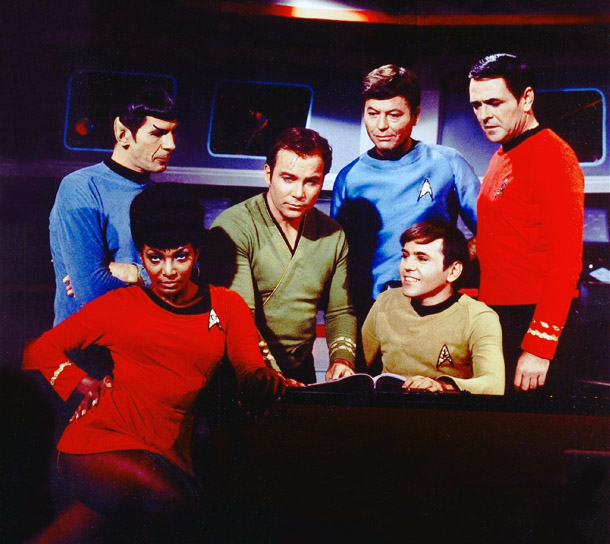BLOG Hungry Audiences And Starving Writers
Troo Topham examines why shows that used to be happy to be episodic are now being forced to go down the arc route

There’s a problem with writing a series, whether your series is only three episodes long or spans entire decades of content: the audience always wants more.
They want bigger. Better. Stronger. Your heroes saved a life last instalment? This week they better save two. They saved a town? Next week it better be a city.
Soon your heroes need to save countries. Worlds. Galaxies. Audiences are hungry, and they always want something new and more impressive than the last thing they consumed. Woe betide the series which begins to escalate, then takes a step backward, downsizing the threat and consequences to stop things getting out of hand.
Writers have two choices: an episodic format which hits the reset button at the end of every story; or a larger story filled with smaller puzzle pieces which contribute to the whole yet are almost self-contained in their own right. These are not mix and match solutions, either, and a great deal of the upset caused among fan communities actually stems from attempting to smoosh these two approaches together.
Perhaps the biggest franchises to try mixing oil and water like this recently have been Star Trek and Doctor Who . As Steve Ellis points out in his recent blog post , Doctor Who fans do like to whip themselves (ourselves) into a frenzy because each new episode either is or is not like the Doctor Who we like. Most fans, though, will blame the actor, the companion, the show-runner. There’s always a hook to hang the uneasy feeling that things aren’t quite right on.
But here’s the real problem: both franchises were born in an episodic format where last week’s adventure was forgotten in favour of this week’s dilemma. That’s how entertainment was made in the 1960s, especially science fiction. The shift toward character growth and development in sci-fi is relatively recent, and the majority of long-term Star Trek fans loathed Deep Space Nine because it had story arcs, character development, and was different from ToS and TNG .
And therein lays the rub. Doctor Who is trying its hand at story arcs, because that’s what audiences want these days. After shows like Babylon 5 , Buffy and Lost , audiences want to see characters grow and develop. They want to know that events in this week’s episode are occurring because of – or at the very least influenced by – events in a previous episode. Audiences want to care about characters, see how they flourish or fail, and how the choices they make and the paths they choose will define them.
Sign up to the SFX Newsletter
Get sneak previews, exclusive competitions and details of special events each month!
But shows like Star Trek and Doctor Who come with baggage: their own fans. Fans who enjoy stories which are self-contained and which do not have to escalate week on week, year on year, to feed the all-consuming hunger of an audience that constantly requires more and bigger meals. Sooner or later, someone’s going to have to jump over a shark.
Raiders Of The Lost Arcs
Doctor Who and Star Trek are very finely constructed to enforce episodic, consequence-free storytelling. They are both built on the existence of ships which can put great distance between episodes, leaving the trials and tribulations of last week far behind and forging onward to this week’s problem. Again, compare this with the arguments against Deep Space Nine : this was set on a space station, so couldn’t escape last week’s consequences. The setting was necessary to bring about a story-arc-fuelled show, but too many people drew parallels with Babylon 5 and screamed plagiarism rather than give this new slant on Star Trek a try.
This approach is leading to a serial special snowflake effect. We cannot have story arcs about places or times, because neither remain with the TARDIS. The only option is to arc on the companions, and so everyone picked up since 2005 has been a unique and beautiful creature who is somehow the most amazing thing since sliced bread. Rose turned into a demi-god. Martha turns into a super-awesome doctor. Donna turns into a super-genius (then has all her development undone, wasting everyone’s time). Amy saves the entire universe. Clara’s the Impossible Girl. Gone are the days when a companion joins the TARDIS, has an awfully big adventure, then randomly decides to leave when their actor quits.
Change, my dear
What do we do? We blame RTD. Or Moffat. Or David Tennant or Matt Smith or Billie Piper or Jenna-Louise Coleman… Anything but accept the fact that Doctor Who is different now. It isn’t about taking four episodes to explore a single story and then move on after saving a few lives; it’s about dashing in, saving the day, and uncovering a little bit more about the companion du jour.
The writer’s challenge isn’t only to give an audience entertainment, it’s also to avoid giving you what you want. The moment you get what you’ve been waiting for, your investment in a show is over. You wanted Scully and Mulder to get together, but the moment they did? Pfft, the magic is gone. You wanted SG-1 to defeat the Goa’uld, but when they do? You just can’t swap in another bad guy. It doesn’t work.
If you keep expecting instalments to get bigger, better, more awesome, there’s only one way it can end. And if you want New to be exactly like Old, there’s only going to be bitter, angry disappointment.


